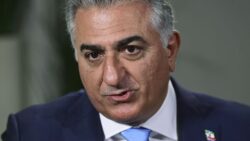The West must maintain pressure on the Iranian regime if it wants to have any impact on it, according to the oldest son of the former Shah of Iran.
In the wake of the country’s biggest protests in years, Reza Pahlavi, the oldest son of deposed Shah Mohammad Reza Pahlavi, told Euronews on Tuesday that he has linked up with young activists both in Iran and outside it to establish an alliance against the Islamic Republic.
Pahlavi, who is currently touring Europe, says sanctions against the Islamic Revolutionary Guard Corps (IRGC) need to be kept up.
“By further adding pressure on the regime, by sanctioning the IRGC and stating it as a terrorist organisation [this] could bring even more abilities to freeze their assets, which is certainly a big chunk,” he said. “And also it will at the same time create an element that will make it even more likely for defections to occur.”
“The bulk of the IRGC members are not benefiting from it financially,” he added.
“They’re getting salaries, sometimes not enough to cope with. They even have a secondary job. How long can they sustain themselves in that package if they think that the time has come for them to reconsider how long they want to stick with this regime as opposed to join with the people?”
When asked if he was posturing, politically speaking, Pahlavi said that this was not the case and that he wants to see a positive change in Iran.
“It’s not a matter of what position I end up with, nor am I running for any office,” he said.
“However, my role is very important in terms of the political capital that I enjoy to bring as much solidarity on a common mission that drives us to manage a period of transition towards the formation of a constituent assembly, which is the only vehicle through which people’s representatives will have to make all the decisions necessary in adopting a new constitution, debate the content of the future system, to be finally ratified by means of a referendum.”
When it comes to the state of his country, Pahlavi says that it has become a North Korea in its own right.
“We know one thing from our domestic perspective, that Iran could have been a South Korea,” he explained.
“Instead, it became a North Korea. It certainly went backward rather than forward. Is that conducive to more stability? No. Is Iran’s weakness something that has contributed to more safety or economic interest or has it actually been the reverse? Every arrow points to the direction that if that theory held true, the net result was no gain, but in fact a loss.”
On Russia and Iran’s mutual cooperation, the exiled Iranian believes that Tehran’s support is purely existential, based on its own survival.
“When you have a regime that out of weakness is prepared to become somehow at the disposal or use by other players in the region, the net result is that this could become a threat to another perspective.
“Iran’s cooperation right now with Russia is a clear indication that the regime is, in fact, trying to count on the Russian support for their own survival and is, in that game, assisting what Russia is doing right now in Ukraine, for instance.”





